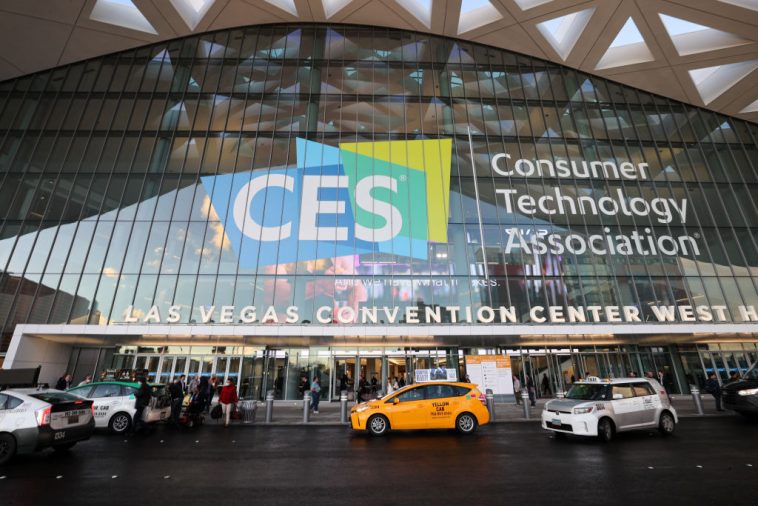CES 2025 officially kicks off in Las Vegas on Tuesday morning, running through the end of the day on January 10. The “official” dates are specific to when the floor of the Las Vegas Convention Center is open to attendees, and ultimately belie the show’s true duration. A pair of press days kick off Sunday with a few smaller events leading up to a scrum of press conferences on January 6.
Press conferences
Image Credits:David Paul Morris/Bloomberg (opens in a new window) / Getty Images
We’ll be watching the following with a close eye here are TechCrunch:
AMD: (Monday at 11 a.m. PT/2 p.m. ET) AMD has its work cut out for it at CES 2025. Competitor Nvidia has been sucking the oxygen out of every room it graces, as the chipmaker remains at the forefront of the AI boom. So, how will AMD compete with Nvidia’s reported RTX 5000 announcement? The company should show off its own next-gen GPU. As part of an ongoing rebrand, the RDNA 4 cards could arrive as either the RX 8000 or RX 9000 series.
Toyota: (Monday at 4 p.m. PT/7 p.m ET) We expect Chairman Akio Toyoda to go all in on Woven City, the carmarker’s “living laboratory.” Our automotive editor Kirsten Korosec adds: “Details are slim about exactly what will be revealed. TechCrunch, which was at the initial announcement in 2020, will be watching to see how startups will be incorporated into Woven City and whether Toyota followed through on its plans to build a fully connected ecosystem powered by hydrogen fuel cells.”
Samsung: (Monday at 5 p.m. PT/8 p.m. ET) Samsung’s CES presser is always an odd duck. The Korean electronics giant generally keeps its powder dry when it comes to consumer electronics. After all, it’s expected to announce its latest flagship handset — the Galaxy S25 — toward the end of January. CES 2025 is going to continue the company’s tradition of TVs and appliances. There are also odds and ends like consumer robots that will most likely never see the light of day. Samsung has adopted the tagline “AI for All: Everyday, Everywhere” for the presentation.
Nvidia: (Monday at 6:30 p.m. PT/9:30 p.m. ET) Nvidia will no doubt have the biggest CES 2025. After all, the company has pretty much the biggest everything nowadays. The chip giant is sporting a $3.4+ trillion market cap, due largely to its foundational position in the ongoing AI boom. Companies like OpenAI and Meta have purchased Nvidia processors by the boatload, and that’s unlikely to change in the new year. Founder and CEO Jensen Huang will help kick off CES 2025 “with his trademark leather jacket and an unwavering vision,” per Nvidia.
Notable keynotes from the following day include Twitter/X CEO Linda Yaccarino at 1:30 p.m. PT and Delta CEO Ed Bastian at 5 p.m. PT. The latter, notably, will take place at jam band hot spot, the Sphere. Both will be available to stream at the official CES YouTube page.
Trends
Image Credits:Brian Heater
The show’s hot topic will almost certainly be the only thing anyone in tech seems to talk about these days: AI. That’s nothing new for CES, of course. The category has been at the forefront for years now, with 2024’s show delivering some of the earliest generative-AI-powered consumer devices.
The Rabbit R1 was, perhaps, the most notable from last year’s show. The handheld generated a lot of buzz at the event, though as with other AI devices like Humane’s AI pin, the product failed to live up to any expectations.
The subject won’t be limited to this manner of product, however. This year, any product that doesn’t mention AI in some form will be in a small minority. As mentioned above, Nvidia and AMD will be going head to head on the chip front. Nvidia will be a particular focus, as the chipmaker sets the stage pace for AI in 2025, including the release of the much anticipated GeForce RTX 50 GPU. The company will also touch on other key categories, including robotics and transportation.
AI will grace everything from cars to refrigerators these year. Some applications will prove genuinely useful, but many — if not most — will be a solution in search of a problem. This is always an important thing to keep in mind at an event like CES. It’s a huge show; last year’s hosted 4,300 companies and nearly 140,000 attendees. There’s a lot of noise, and plenty of AI “applications” exist in attempt to rise above it.
Image Credits:Kirsten Korosec
Over the past decade, CES has transformed into one of the year’s top automotive shows. This has primarily been driven by automotive manufacturers’ bids to becoming bleeding-edge pioneers: Where better to showcase that than the year’s biggest consumer tech show? The 2021 addition of the Las Vegas Convention Center’s new West Hall has facilitated that expansion.
Questions remain whether CES can maintain its status as a major car show. Anecdotally, fewer large names appear to be participating in a meaningful way, including U.S. manufacturers like Ford. This is likely due, in part, to Detroit’s North American International Auto Show returning after a year off. That event is set to kickoff January 10, overlapping with CES.
That’s not to say that there won’t be big headlines out of Vegas next week. In addition to Toyota’s participation, Sony’s press conference should once again feature Afeela, the company’s collaboration with Honda. Firms like Hyundai — which now owns Boston Dynamics — will likely showcase its focus on humanoid and other robotics.
Image Credits:Hyundai
Robotics have increasingly become a focus point for CES in recent years. I anticipate most transportation companies discussing the topic, from manufacturing to eVTOLs. The car industry has been the tip of the automated manufacturing sphere for years, a fact accelerated by various employment and supply chain crises since the pandemic. eVTOLs, meanwhile, scored a major FAA win late last year.
CES continues to be a major launching pad for computer monitors. In fact, Samsung, ASUS and MSI all announced the addition of “the world’s first” 27-inch 4K OLED monitors with 240Hz refresh rates. Smart appliances always get a lot of love at the show, as well. LG has already revealed a bunch of news on that front. Samsung should follow suit at its press conferences on Monday.
After an extended lull, I anticipate a new wave of smart home devices. Between interoperability through the Matter standard, the explosion of generative AI platforms, and a second wind for smart assistants from Google, Amazon, and Apple, companies will be showcasing how these devices might excel where their predecessors failed.
Image Credits:Cory Green/Yahoo
After its latest hype cycle, extended reality still has a lot to prove. The Vision Pro hasn’t taken off as Apple had hoped, and competitors are struggling to compete with Meta’s ability to subsidize the cost of the Quest. Big names in the space like HTC and Magic Leap have largely pivoted to enterprise applications. Chipmakers like Qualcomm, however, are still very much focused on making a splash.




GIPHY App Key not set. Please check settings